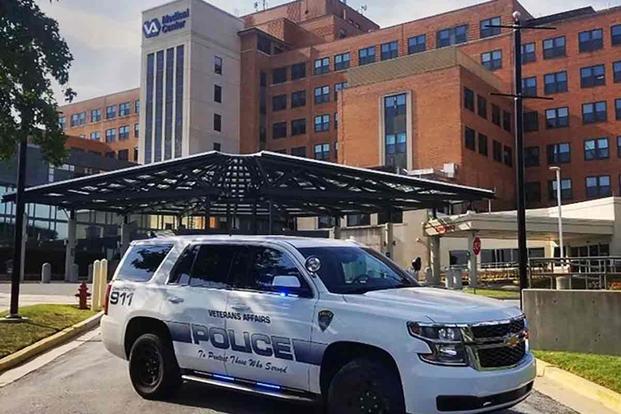The Veterans Affairs Police Service will begin equipping its officers with body and dashboard cameras this month, part of a White House effort to hold federal law enforcement agencies accountable and ensure transparency in conducting their duties.
The Department of Veterans Affairs announced Friday that the entire 4,670-member VA force will be equipped by the end of the year -- a move officials say will help it to protect veterans, families, visitors and employees while in VA facilities.
"Thousands of VA police officers bravely protect and serve anyone who sets foot on a VA facility," Veterans Health Administration Senior Security Officer Troy Brown said in a press release. "By outfitting every VA police officer with a body-worn camera, we're enhancing transparency and ensuring safety and accountability in policing."
Read Next: In the Wake of High-Profile Suicides, the Army and Navy Are Trying to Adapt
According to the VA, the cameras will automatically record video and audio if an officer draws their issued firearm or when emergency lights are activated in police vehicles.
Officers also are expected to manually turn on their cameras when conducting investigations and during encounters such as responses to calls, enforcement encounters, traffic stops and transporting suspects.
President Joe Biden signed an executive order on May 25, 2022 -- the second anniversary of the murder of a Minneapolis man, George Floyd, by a police officer -- that required a number of changes to federal law enforcement agency policies, such as the creation of a database of officer misconduct, de-escalation training and camera use.
While Floyd's death and subsequent protests against police conduct led to reforms of police departments at the local level, fewer changes had been made at the federal level. The executive order, "Advancing Effective, Accountable Policing and Criminal Justice Practices to Enhance Public Trust and Public Safety," sought to change this.
"Our great police officers keep veterans, their families, caregivers, and survivors safe at VA facilities every day," VA Secretary Denis McDonough said in the statement Friday. "Using dash cams and body cams will make our facilities even safer, building trust in our great police force while increasing transparency and promoting de-escalation."
The VA's Desert Pacific Healthcare Network will be the first to get the cameras, beginning next week.
Officials said that the VA has taken steps to ensure that the use of cameras does not infringe on the privacy of VA patients, visitors or employees and that the cameras will be used only for police investigations, court proceedings or "for limited other purposes as allowed under federal law."
"Unless there is a clear and compelling need for a recording, no video will be recorded in locations where a reasonable expectation of personal privacy exists," VA officials wrote in the release.
Most, if not all, VA facilities have static security cameras in place, but the department historically has struggled to maintain them. Earlier this year, a VA Office of Inspector General investigation found that more than 20% of cameras at 24 inspected facilities were inoperable. At one facility in a large, unidentified northeastern city, only half of the static cameras were operational.
Lawmakers called for security improvements with security and cameras at VA medical facilities following several high-profile incidents that weren't recorded, including the assault of a Navy veteran and congressional staffer at the VA Medical Center in Washington, D.C., and the murders of seven veterans at the Louis A. Johnson VA Medical Center in Clarksburg, West Virginia, at the hands of a nurse.
-- Patricia Kime can be reached at Patricia.Kime@Military.com. Follow her on Twitter @patriciakime
Related: VA Stepping Up Security as It Begins Providing Abortions












